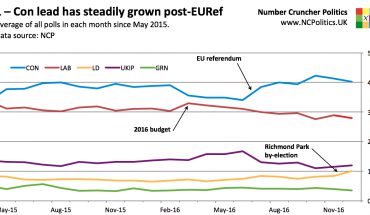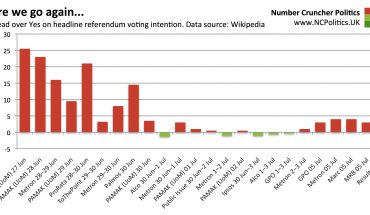Incumbency effects
We need to make some further adjustments, to reflect the likely outperformance of the Lib Dem MPs newly elected in the previous election, together with the likely underperformance of Lib Dem candidates replacing those standing down this time. As May2015 has reported, Ashcroft’s polls show this incumbency effect strongly applies in the case of Lib Dems, which echoes academic research.
For example Tim Smith’s work has estimated the incumbency effect at each British election since 1983. I prefer to exclude 1983, due to the likely distortions caused by the mass defection of incumbents to the then Liberal/Social Democratic Party Alliance from other parties (mostly Labour). From 1987 to 2010, the advantage to the Lib Dems of having an incumbent seeking re-election was about 10 points net (5 per cent swing) over both Conservative and Labour challengers.
Using a 10 point adjustment would, on these projections, save the Lib Dems 4 seats net from Tory challengers. It wouldn’t change any LIB-LAB contests, because all of the affected seats would be lost, with or without the adjustment.
Thus we arrive at a “nowcast” of 28 holds, 12 losses to Labour, 10 losses to the Conservatives and 7 losses to the SNP, including 4 seats where the SNP plus another party relegate the Lib Dems to third place.
Some have gone further, suggesting that Lib Dem incumbents might outperform a substantial swing against them. The evidence on this is mixed. In 2010, the Lib Dem vote share in seats being defended by non-first time incumbents actually declined by 1.1 points whereas it increased by 1.3 points nationally. About a point of that disparity can be explained by the fact that the Lib Dems, no longer led by Charles Kennedy, underperformed markedly in Scotland (where they were defending 10 of their 62 seats), seemingly to the benefit of Labour, then led by Gordon Brown.
The rest is harder to explain. It could be that the Lib Dems’ national vote increase came from anti-Tory voters who had previously voted Labour in non-Lib Dem seats, but who would already have been voting Lib Dem in Lib Dem seats. Normally polling data would be useful here, but unfortunately the polls can’t help in this case, because in aggregate they showed a Lib Dem national gain about three times larger than actually transpired.
What about well-known, long-serving incumbents? I’ve taken the 54 seats that Lib Dem incumbents defended in 2010 and grouped them by their year of first election to the Commons. For the reasons above, I’ve separated Scotland from the rest of Great Britain. We can see that the class of 2005 outperform their seniors, as expected. But among the other cohorts, there is no pattern to suggest a seniority bias, they all underperform the national vote change by similar amounts.
How well this would hold in the face of an overall collapse on the scale the polls currently suggest is hard to say. History tells us very little – the Liberal Democrats have never dropped more than 5 points in a single electoral cycle, and the original Liberal Party last did so in 1951.
In the Ashcroft poll, Simon Hughes (first elected 1983) in Bermondsey significantly outperforms the rest of the Lib-Lab battleground. But in contests with the Conservatives, the only statistically significant outperformance by a long-standing MP is in Sutton and Cheam, where Paul Burstow (1997) has managed to turn the swing on its head, achieving a 7 per cent swing away from the Tories. Elsewhere in the poll there is no evidence of such a trend.
So while having a large “personal vote” may matter when an MP retires, it is less clear that longer-serving MPs are better able to withstand a collapse in the national vote.





